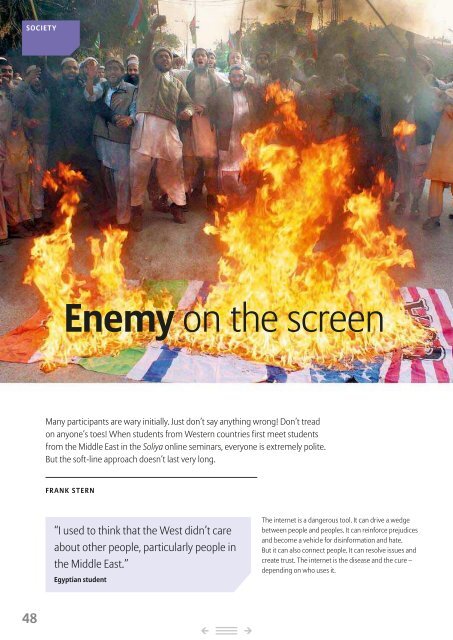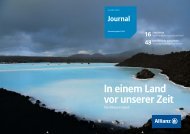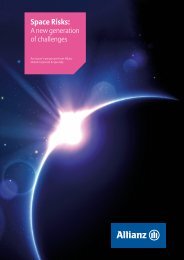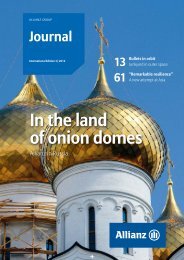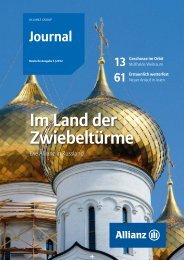Journal - Allianz
Journal - Allianz
Journal - Allianz
You also want an ePaper? Increase the reach of your titles
YUMPU automatically turns print PDFs into web optimized ePapers that Google loves.
SOCIETY<br />
Shutterstock<br />
<strong>Allianz</strong> Group <strong>Journal</strong> 2/2013<br />
“In the USA there’s extreme<br />
unease with regard to Islam,<br />
but Soliya has taught me to<br />
see people as individuals and<br />
to find out what they think<br />
instead of tarring everyone<br />
with the same brush.”<br />
American student<br />
SOLIYA<br />
Soliya was set up ten years ago with the aim of<br />
providing young people from Muslim and Western<br />
countries with intercultural experiences. The NGO<br />
with offices in New York and Cairo relies entirely<br />
on the internet to put students from all over the<br />
world in virtual contact with each other.<br />
Over 100 universities worldwide are now involved,<br />
and many of them have integrated the online<br />
training program Connect into their syllabus.<br />
Enemy on the screen<br />
Many participants are wary initially. Just don’t say anything wrong! Don’t tread<br />
on anyone’s toes! When students from Western countries first meet students<br />
from the Middle East in the Soliya online seminars, everyone is extremely polite.<br />
But the soft-line approach doesn’t last very long.<br />
FRANK STERN<br />
“I used to think that the West didn’t care<br />
about other people, particularly people in<br />
the Middle East.”<br />
Egyptian student<br />
The internet is a dangerous tool. It can drive a wedge<br />
between people and peoples. It can reinforce prejudices<br />
and become a vehicle for disinformation and hate.<br />
But it can also connect people. It can resolve issues and<br />
create trust. The internet is the disease and the cure –<br />
depending on who uses it.<br />
The terrorist attack on New York had occurred just<br />
two years previously when Lucas Welch set up Soliya in<br />
2003 to build bridges through intercultural exchanges.<br />
While the world was exhausting itself in the Clash of<br />
Civilizations, the American, a former TV producer for<br />
the broadcaster ABC and media lecturer at the Bir Zeit<br />
University in Ramallah, was developing a concept for<br />
understanding and conciliation. It’s not by chance that<br />
Soliya is a combination of the Latin sol (sun) and the<br />
Arabic word for light.<br />
Soliya uses the internet to bring students together<br />
from various countries via video conferencing. The<br />
10-week Connect program is now running in over<br />
100 universities in 27 countries – from Egypt to Indone -<br />
sia and from the USA to Switzerland. Some institutions<br />
have even included Connect in their regular study<br />
program. The <strong>Allianz</strong> Foundation of North America<br />
became a sponsor of Soliya last year. “It’s about understanding,<br />
overcoming prejudices and respecting each<br />
other,” says Foundation head Christopher Worthley.<br />
“A goal that we’re also committed to.”<br />
The internet as a bridge between peoples and cultures<br />
that could hardly be more different from each other:<br />
Osama Madani, English professor at Menoufia University<br />
in Shibin El Kom, 75 kilometers from Cairo, witnessed<br />
how his students were on the defensive when they first<br />
sat at the screen in front of Jewish students from the<br />
USA – effectively their arch enemies – and how in the<br />
course of the discussions each found common ground<br />
WWW.SOLIYA.ORG<br />
or at least an understanding of their counterpart’s<br />
attitudes. “By the end of the semester the mindset of<br />
many of my students had completely changed,” says<br />
Madani. Meanwhile, the list of students who want to<br />
take part in the program has grown ever longer.<br />
Moderators supervise the online discussions to overcome<br />
initial anxieties or to avoid overheated debates.<br />
“Sometimes they even have trouble getting a discussion<br />
going because the participants are just too polite<br />
to each other,” explains Soliya CEO Shamil Idriss. On<br />
the other hand, there’s no shortage of topics to ignite<br />
an argument between the West and the Middle East.<br />
And in the course of the semester nothing is taboo –<br />
whether Islamist terrorism, Islamophobia, the relationship<br />
between religion and the state, the role of women<br />
in society or homosexuality.<br />
The difference in their worldviews is regularly demonstrated<br />
when the participants are asked to edit a news<br />
item based on raw footage provided by the US wireservice<br />
Associated Press and the Arabic broadcaster<br />
Al Jazeera in a balanced manner. Up to that point the<br />
online discussions may have been somewhat hesitant,<br />
48<br />
<br />
<br />
<br />
<br />
49


